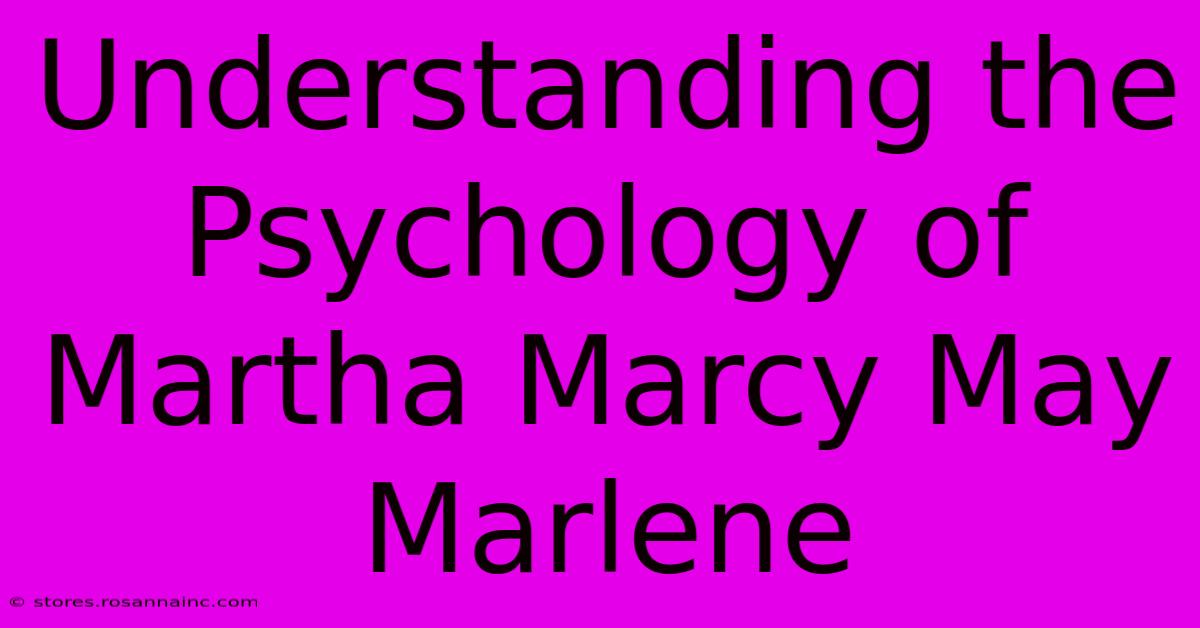Understanding The Psychology Of Martha Marcy May Marlene

Table of Contents
Understanding the Psychology of Martha Marcy May Marlene
Sean Durkin's Martha Marcy May Marlene isn't just a chilling thriller; it's a masterful exploration of trauma, manipulation, and the fragile nature of identity. The film's power lies not just in its unsettling atmosphere, but in its nuanced portrayal of Martha's psychological state, leaving audiences questioning reality and the complexities of escaping a cult. This article delves into the psychological underpinnings of the film, examining Martha's experiences and the techniques used to depict her fractured psyche.
The Trauma of the Cult Experience
Martha's time in the cult, led by the charismatic Patrick, is depicted as a deeply traumatic experience. The film subtly reveals the insidious methods of manipulation used by Patrick and his followers. Isolation, sleep deprivation, emotional manipulation, and spiritual coercion are all key elements that contribute to Martha's psychological breakdown. These tactics effectively break down an individual's sense of self, replacing it with a cult-defined identity and fostering absolute dependence on the group. The film masterfully portrays the gradual erosion of Martha's autonomy, highlighting the insidious nature of cult indoctrination. This isn't a sudden, violent kidnapping; it's a slow, creeping takeover of her mind and will.
Stockholm Syndrome and its Manifestation
Martha's behavior upon returning to her family suggests a possible manifestation of Stockholm Syndrome. This psychological response involves developing positive feelings towards one's captors, even after experiencing abuse. While the film doesn't explicitly label Martha's feelings, her wavering loyalty and inconsistent memories suggest a complex emotional response to her time in the commune. Her inability to fully separate herself from the cult's ideology and her lingering affection for certain members demonstrate the enduring impact of traumatic bonding.
Dissociation and the Fragile Self
The film uses a powerful visual style to reflect Martha's fractured mental state. Flashbacks and uncertain timelines blur the line between reality and delusion, mirroring Martha's struggle to process her traumatic experiences. This visual technique accurately portrays the symptoms of dissociation, a common coping mechanism for individuals who have experienced severe trauma. Dissociation allows the mind to compartmentalize overwhelming experiences, effectively shielding itself from the full emotional impact. Martha's fragmented memories and her inability to fully articulate her experiences are key indicators of this dissociative state.
The Power of Gaslighting and Manipulation
Patrick's manipulative tactics are central to Martha's psychological unraveling. He uses gaslighting, a form of emotional abuse where the abuser manipulates the victim into questioning their own sanity and perception of reality. This is evident in the scenes where Patrick subtly contradicts Martha's memories and rewrites her understanding of events. The film expertly shows how gaslighting slowly erodes an individual's self-confidence and ability to trust their own judgment. This technique is crucial in understanding how Martha becomes so easily controlled within the cult environment.
The Struggle for Identity and Reintegration
Martha's return to "normal" life is far from easy. She's haunted by her past, struggling to reconcile her experiences with her previous identity. Her attempts to reconnect with her family are fraught with tension and misunderstanding, highlighting the difficulty of reintegrating into society after such profound trauma. The film's ambiguous ending leaves the audience questioning whether Martha has truly escaped the cult's influence or whether the trauma will continue to shape her future. This ambiguity underscores the long-term impact of cult indoctrination and the ongoing struggle for identity and recovery.
Conclusion: A Psychological Masterpiece
Martha Marcy May Marlene is a powerful and disturbing exploration of the psychological effects of cult indoctrination and trauma. Through its masterful use of visual techniques, subtle storytelling, and nuanced portrayal of Martha's mental state, the film offers a compelling insight into the complexities of survival, recovery, and the enduring power of manipulation. It's a film that stays with you long after the credits roll, prompting reflection on the fragility of identity and the insidious nature of psychological control. The film's lasting impact lies in its ability to illuminate the often-hidden struggles of those who have survived such traumatic experiences.

Thank you for visiting our website wich cover about Understanding The Psychology Of Martha Marcy May Marlene. We hope the information provided has been useful to you. Feel free to contact us if you have any questions or need further assistance. See you next time and dont miss to bookmark.
Featured Posts
-
Watch Harry Connick Jr S Super Bowl
Feb 10, 2025
-
Witness The Majesty A Tre Cime Di Lavaredo Sunrise Hike
Feb 10, 2025
-
Solve The Mystery Where In The World Is Shakira From
Feb 10, 2025
-
Comment Regarder Le Super Bowl 2025
Feb 10, 2025
-
Unlocking Inner Peace The Nothing More Nothing More Philosophy
Feb 10, 2025
